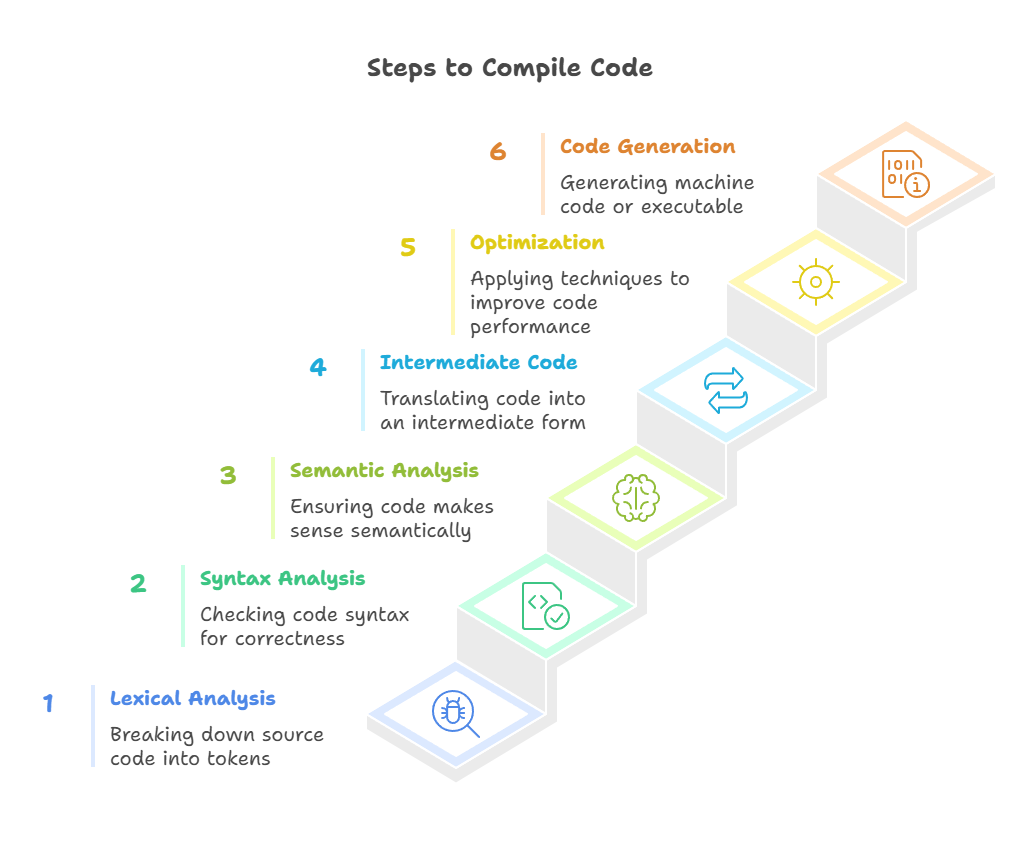Advance compiler techniques
In the world of programming, compilers play a crucial role in translating human-readable code into machine-executable instructions. Understanding advanced compiler techniques is essential for optimizing code performance, enhancing security, and enabling advanced features. In this chapter, we'll delve into the depths of compiler techniques, starting from the basics and progressing to more advanced concepts.
Overview of Compilation Process
Before diving into advanced techniques, it’s crucial to grasp the fundamentals of the compilation process. Here’s a breakdown:
- Lexical Analysis: The compiler breaks down the source code into tokens like keywords, identifiers, literals, etc.
- Syntax Analysis: It checks the syntax of the code for correctness based on the grammar rules of the programming language.
- Semantic Analysis: This phase ensures that the code makes sense semantically, including type checking and variable usage.
- Intermediate Code Generation: The compiler translates the source code into an intermediate representation for further optimizations.
- Optimization: Various optimization techniques are applied to improve the performance and efficiency of the code.
- Code Generation: Finally, the compiler generates the machine code or executable from the optimized intermediate representation.

Loop Unrolling: This technique involves replicating loop bodies to reduce loop overhead and improve instruction-level parallelism.
console.log("helloword")a/ Original loop
for (int i = 0; i < 4; i++) {
printf("%d\n", i);
}
// After loop unrolling
printf("0\n");
printf("1\n");
printf("2\n");
printf("3\n");
0
1
2
3
Inline Expansion: Inlining small functions at their call sites can eliminate function call overhead.
// Original function
inline int add(int a, int b) {
return a + b;
}
// After inline expansion
int result = 10 + 20;
Constant Folding: Evaluating constant expressions at compile-time rather than runtime.
// Before constant folding
int result = 5 * 10;
// After constant folding
int result = 50;
Advanced Code Generation Techniques
- Register Allocation: Allocating variables to processor registers to minimize memory access.
- Instruction Scheduling: Reordering instructions to optimize pipeline usage and reduce stalls.
- Vectorization: Utilizing SIMD (Single Instruction, Multiple Data) instructions to process multiple data elements simultaneously.
Advanced compiler techniques play a pivotal role in enhancing the performance, efficiency, and security of C programs. By understanding and applying these techniques, developers can unlock the full potential of their code, leading to faster execution and better resource utilization. Continual exploration and utilization of advanced compiler techniques are essential for staying ahead in the ever-evolving landscape of software development.Happy coding!❤️
